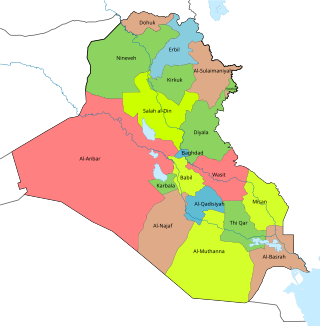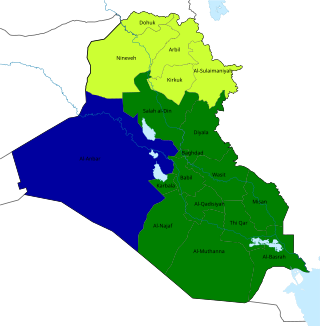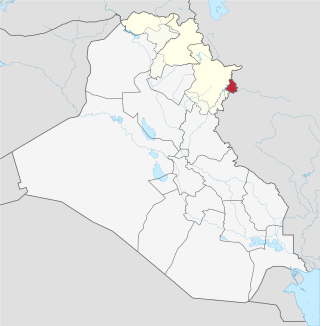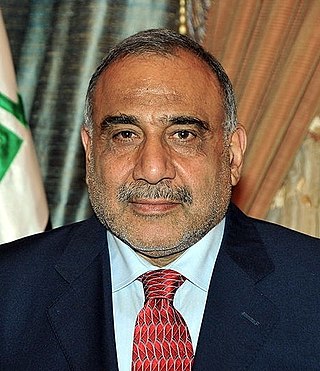Iraq is a federal parliamentary representative democratic republic. It is a multi-party system whereby the executive power is exercised by the Prime Minister of the Council of Ministers as the head of government, the President of Iraq as the head of state, and legislative power is vested in the Council of Representatives.

Iraq consists of 18 recognized governorates, also known as "provinces" and 1 partially recognized governorate (Halabja). Per the Iraqi constitution, governorates can form an autonomous region. Four governorates, Erbil, Sulaymaniyah, Halabja and Duhok, constitute the autonomous Kurdistan Region. Baghdad and Basra are the oldest governorates. The second most-populous one, Ninawa is in the upland region and has a cooler climate of the north-west.

Parliamentary elections were held in Iraq on 30 January 2005 to elect the new National Assembly, alongside governorate elections and a parliamentary election in Kurdistan Region. The 275-member legislature had been created under the Transitional Law during the international occupation. The newly elected body was given a mandate to write a new constitution and exercise legislative functions until the new constitution came into effect. The elections also led to the formation of the Iraqi Transitional Government.
Under the Iraqi constitution of 1925, Iraq was a constitutional monarchy, with a bicameral legislature consisting of an elected House of Representatives and an appointed Senate. The lower house was elected every four years by manhood suffrage. The first Parliament met in 1925. Ten general elections were held before the overthrow of the monarchy in 1958.

The Council of Representatives, usually referred to simply as the Parliament, is the unicameral legislature of the Republic of Iraq. According to the Constitution of Iraq, it is the lower house of the bicameral legislature of the country. As of 2020, it comprises 329 seats and meets in Baghdad inside the Green Zone.

Governorate or provincial elections were held in Iraq on 31 January 2009, to replace the local councils in fourteen of the eighteen governorates of Iraq that were elected in the 2005 Iraqi governorate elections. 14,431 candidates, including 3,912 women, contested 440 seats. The candidates came from over 400 parties, 75% of which were newly formed.

Parliamentary elections were held in Iraq on 7 March 2010. The elections decided the 325 members of the Council of Representatives who would elect the prime minister and president. The elections resulted in a partial victory for the Iraqi National Movement, led by former Interim Prime Minister Ayad Allawi, which won 91 seats, making it the largest alliance in the Council. The State of Law Coalition, led by incumbent Prime Minister Nouri Al-Maliki, was the second largest grouping with 89 seats.

The al-Hadba party is a political party formed to contest the 2009 Iraqi governorate elections in Ninawa province. It is mostly made up of Sunni Arabs. Its leading member Atheel al-Nujaifi is brother of Usama al-Najafi who is part of the Iraqi National List led by former Iraqi Prime Minister, Ayad Allawi. It has also been reported that members of the coalition have the backing of Shiite Prime Minister Nouri al-Maliki.

Governorate or provincial elections were held in Iraq on 20 April 2013, to replace the local councils in the governorates of Iraq that were elected in the Iraqi governorate elections of 2009. Elections took place in 12 of Iraq's 18 governorates. Elections didn't take place in the 3 governorates forming the Kurdistan Region or Kirkuk, Anbar, or Nineveh, meaning that a total of 378 provincial council seats were up for election.

Najmiddin Karim, also known as Najmaldin Karim, was an Iraqi Kurdish politician who was governor of Kirkuk Governorate from 2011 to 2017. Prior to the invasion of Iraq, Karim had served in numerous Kurdish and Iraqi opposition groups.

The 2013 Nineveh Governorate election in Iraq was held on 20 June with elections for the Al Anbar Governorate. Due to security problems, turnout was less than half that of the 2009 election. This election saw Sunni Arab parties lose a number of seats to minority parties.

Halabja Governorate is a governorate in the autonomous region of Kurdistan Region in Iraq. The governorate was established in 2014, splitting off from Sulaymaniyah Governorate and becoming the fourth governorate in the Kurdistan Region of Iraq. Its capital is the city of Halabja. Halabja Governorate is the least populated governorate.

The first Rojava regional elections were held on 1 December 2017. Local councils for the Jazira Region, Euphrates Region and Afrin Region were elected as well as for the subordinate cantons, areas and districts of the regions of Rojava. This followed the communal elections that were held on 22 September and was to be followed by a federal parliamentary election of the Syrian Democratic Council, the region's highest governing body, initially scheduled for January 2018, but was later postponed.

Parliamentary elections were held in Iraq on 12 May 2018. The elections decided the 329 members of the Council of Representatives, the country's unicameral legislature, who in turn will elect the Iraqi president and prime minister. The Iraqi parliament ordered a manual recount of the results on 6 June 2018. On 10 June 2018, a storage site in Baghdad housing roughly half of the ballots from the May parliamentary election caught fire.

The Abdul Mahdi government was the government of Iraq, headed by Prime Minister Adil Abdul-Mahdi. It was approved by the Council of Representatives on 24 October 2018 and followed a general election in May 2018. The United Nations described the formation as an "exemplary peaceful transfer of power".
The Kurdistani Coalition or Kurdistan Alliance Party is an electoral coalition founded by the major Kurdish parties of Kurdistan Region to run in the next Iraqi governorate elections. The coalition will run in the disputed areas between Iraq and Kurdistan Region and Baghdad Governorate to consolidate Kurdish votes. A total of 96 candidates will run as part of the coalition.

A series of demonstrations, marches, sit-ins and civil disobedience took place in Iraq from 2019 until 2021. It started on 1 October 2019, a date which was set by civil activists on social media, spreading mainly over the central and southern provinces of Iraq, to protest corruption, high unemployment, political sectarianism, inefficient public services and foreign interventionism. Protests spread quickly, coordinated over social media, to other provinces in Iraq. As the intensity of the demonstrations peaked in late October, protesters’ anger focused not only on the desire for a complete overhaul of the Iraqi government but also on driving out Iranian influence, including Iranian-aligned Shia militias. The government, with the help of Iranian-backed militias responded brutally, using live bullets, marksmen, hot water, hot pepper gas and tear gas against protesters, leading to many deaths and injuries.
Parliamentary elections were held in Iraq on 10 October 2021. The elections determined the 329 members of the Council of Representatives who in turn elected the Iraqi president and confirmed the prime minister. 25 million voters are eligible to take part in Iraq's fifth parliamentary election since the 2003 US-led invasion and the first since the 2019 Iraqi October Revolution. The election result led to the clashes in Baghdad and an 11 month long political crisis.

Between the parliamentary election in October 2021 and October 2022, there was a political crisis in Iraq, with members of the Council of Representatives of Iraq being unable to form a stable coalition government, or elect a new President. Basic government services such as the civil service and military continued functioning, but the national political system was in deadlock including in respect of almost all major spending and taxation issues. On 27 October 2022, the government of Prime Minister Mohammed Shia' Al Sudani was approved by the Council of Representatives.
The Iraqi governorate elections were held for the first time in almost 10 years on December 18, 2023, after many delays, mostly due to the demonstrations demanding the end of the existing political system in 2019. Governorates under the KRG did not participate. For the Assyrians, reserved seats were allocated in the following governorates: Basra, Baghdad, Kirkuk, and Ninewa. While the goal of these seats being reserved is to have Assyrian community representation in the respective governorate councils, Iraqi election law allows anyone, be it Assyrian or not, to vote for them. This had led to the Assyrian reserved seats be hijacked by pro-Iranian parties, with mobilization of mostly Shia Arabs voting for the Babylon Movement.



















